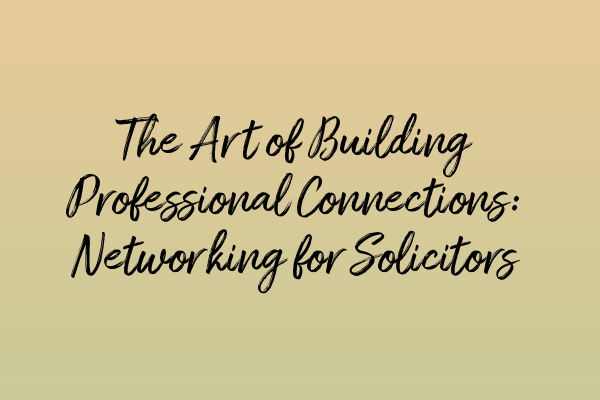The Art of Building Professional Connections: Networking for Solicitors
As a solicitor, building a strong professional network is essential to your success. Networking allows you to expand your reach, gain knowledge, and open doors to new opportunities. However, networking is not just about attending events and collecting business cards. It is an art that requires strategy, genuine connections, and effective communication. In this article, we will explore the art of building professional connections and provide you with actionable tips to enhance your networking skills.
1. Start with a Clear Purpose
Before you dive into networking, it is important to have a clear purpose in mind. What are your career goals? Who are the key players in your field? What do you hope to gain from building professional connections? Answering these questions will help you focus your efforts and make meaningful connections that align with your objectives.
2. Attend Relevant Events
Networking events provide the perfect opportunity to meet like-minded professionals and potential clients. Research and identify events that resonate with your practice area or specialism. For example, if you specialize in criminal law, attending events focused on criminal justice or legal reform can help you connect with individuals who share your interests. Make sure to arrive prepared, with plenty of business cards and a well-thought-out elevator pitch to introduce yourself.
3. Leverage Online Platforms
In today’s digital age, online platforms have become invaluable tools for networking. LinkedIn, in particular, is a powerful platform for solicitors to connect with fellow legal professionals, clients, and potential employers. Ensure your LinkedIn profile is up-to-date, complete with a professional photo, a compelling summary, and details of your expertise. Engage with relevant content, join industry groups, and reach out to people you would like to connect with.
4. Be Authentic and Genuine
When networking, it is crucial to be authentic and genuine. Building strong connections is not about using people for personal gain, but rather about establishing mutually beneficial relationships. Take the time to get to know people, listen actively, and show a genuine interest in their work and accomplishments. Offer assistance or insights whenever possible, without expecting anything in return. People are more likely to remember and support those who come across as authentic and kind-hearted.
5. Follow Up and Stay Connected
Networking doesn’t end after exchanging business cards. The real value lies in nurturing and maintaining the connections you make. After an event or meeting, make it a point to follow up with a personalized email or message, referencing something you discussed. Consider sharing relevant articles or resources that might be of interest to your connections. Set reminders to reach out from time to time, just to check in and see how they are doing. Building a strong network requires ongoing effort and nurturing.
6. Seek Mentorship and Support
Networking is not just about building connections with peers; it also includes seeking mentorship and support from more experienced solicitors. Mentorship can provide guidance, share valuable insights, and help you navigate the challenges of your legal career. Seek out respected professionals in your field who are willing to share their knowledge and experience. Attend mentorship events or consider joining professional associations that offer mentorship programs.
In conclusion, networking is a vital skill for solicitors looking to grow their professional careers. By approaching networking as an art, with purpose and authenticity, you can build a strong network that supports your goals. Remember to attend relevant events, leverage online platforms, be genuine in your interactions, follow up and stay connected, and seek mentorship and support. Mastering the art of networking will not only enhance your professional growth but also contribute to the success of your legal practice.
Related Articles:
– Private Prosecutions: Exploring Non-Governmental Prosecutions in Criminal Cases
– Rights of the Accused: Protecting Individual Liberties in Criminal Proceedings
– Magistrates’ Court vs Crown Court: Understanding Key Differences
– Protecting Vulnerable Witnesses in Criminal Trials: Best Practices and Legal Safeguards
– Unraveling the Complexities of UK Bail Laws


Leave a Reply